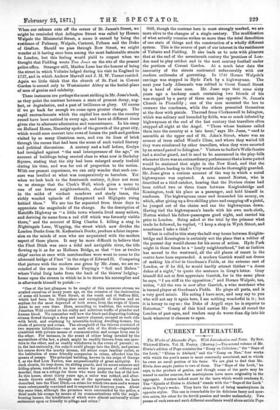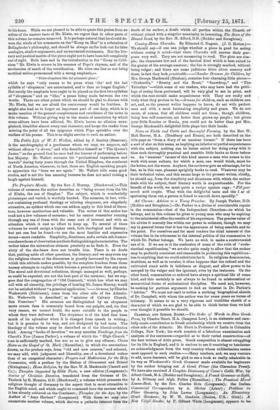CURRENT LITERATURE.
The Works of Alexander Pope. TVith Introduction and Notes. By Rev. Whitwell Elwin. Vol. IL Poetry. (Murray.)—The second volume of Mr. Elwin's edition of Pope contains the "Essay on Criticism ;" the "Rape of the Lock," "Eloisa to Abelard," and the "Essay on Man," four works with which the poet's name is moat constantly associated, and to which he owes no small portion of his fame. We are glad to find that Mr. Elwin does ample justice to two of them. The "Rape of the Lock," he says, is the product of genius, and though some of the parts may be traced to earlier sources, few masterpieces have more originality in the aggregate. Austere indeed must be the taste which would condemn it. The "Epistle of Eloise to Abelard " stands with the "Rape of the Lock' alone in Pope's works. They have the merit of being masterpieces in opposite styles. The one is remarkable for its delicious fancy and spor- tive satire, the other for its fervid passion and tender melancholy. Two poems of such rare and such different excellence would alone entitle Pope to his fame. While we are pleased to be able to quote this praise from an editor of the austere taste of Mr. Elwin, wo regret that in other parts of this volume he remains unmoved. It is perhaps natural that he should de- vote the whole of his comments on the "Essay on Man" to a refutation of Bolingbroke's philosophy, and should be always on the look-out for false analogies, shallow arguments, and unwarranted statements. But the lite- rary and poetical merits of the piece ought not to have been loft completely out of sight. Both here and in the introduction to the "Essay on Criti- cism" Mr. Elwin is severe in his censure of Pope's rhymes, and of the mechanism of much of the versification. He cites one line as not being metrical unless pronounced with a wrong emphasis,—
"False eloquence like the prismatic glass ;"
which he says "only ceases to be prose when 'the' and the last syllable of ' eloquence' are accentuated, and is then no longer English." But surely the emphasis here ought to be placed on the first two syllables of "eloquence " and on "like," a pause being made between the two words. There are other points which we should be glad to discuss with Mr. Elwin, but we are afraid the controversy would be fruitless. It might also lead us to forget an important part of our duty, which'is to make mention of the general completeness and excellence of the notes in this volume. Without giving way to the mania of annotation by which some editors have been afflicted, Mr. Elwin leaves no allusion unex- plained, identifies almost every real character, and keeps the reader from missing the point of all the epigrams which Pope sprinkles over the surface of his poems. This is no slight service to such an author.



































 Previous page
Previous page